#biblical eschatology
Text


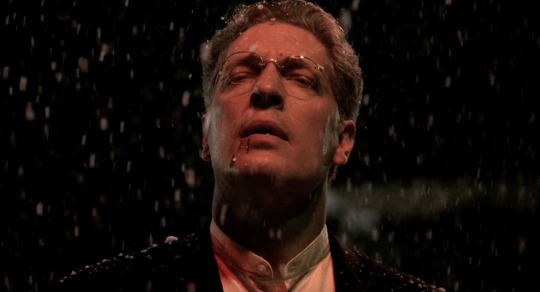


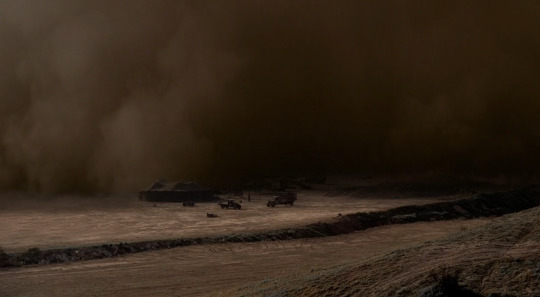
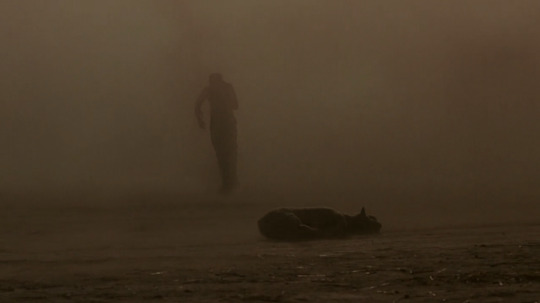


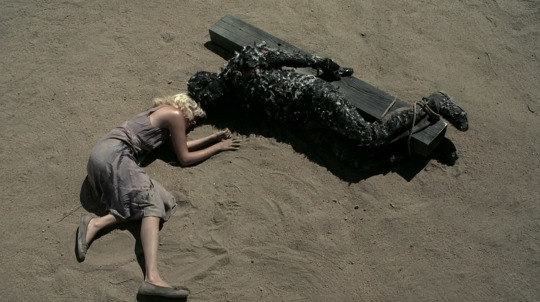

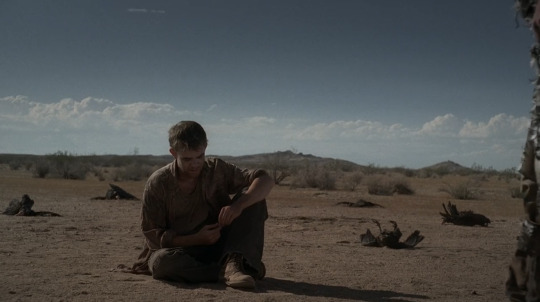






Carnivàle (2003-2005), Any Way the Wind Blows by Anaïs Mitchell
#‘flood’ll get you if the fire don’t’ is such a beautiful lyric in the biblical/eschatological sense#if you are not condemned to hell then you will be drowned by your diluvial god; either way you’re a sinner#I think readings like that work a lot for this show & its bleakness and depravity in the face of desperation#christ as centrifugal force — everything revolving and rotating around/because of him#coupled w the cyclical & circulatory nature of the narrative. ouroboros: ben as the mouth#was considering using a shot of babylon for the last one... but the rot spreading out from the cross ben waited on is too moving#also I cannot tell you how long this took. every single site I used buffered like hell#but I powered through… for the vision… by god I hope this is something#carnivàle#mine
9 notes
·
View notes
Text
A Biblical Greek Translation of Hebrews 9:26 that Changes Everything We Thought We Knew About Jesus
Eli Kittim
youtube
#biblical greek#koinegreek#newtestamentgreek#hebrews9v26#bible verse#ελικιτίμ#εκ#last days#το μικρό βιβλίο της αποκάλυψης#endtimes#eschatology#elikittim#youtube video#biblicalbombshell#end of the age#greekexegesis#bible translation#academicbiblestudies#concordancestudies#lxx#septuagint#συντελείατωναιώνων#thelittlebookofrevelation#ek#1Peter1v20#thejesusprophecy#atonement#TheFirstComingofJesusattheEndofDays#biblical_criticism_and_history_forum#Christian_texts_and_history
4 notes
·
View notes
Text
youtube
A Biblical Greek Translation of Hebrews 9:26 that Changes Everything We Thought We Knew About Jesus
By Eli Kittim 🎓
#Youtube#biblical greek#koinegreek#newtestamentgreek#hebrews9v26#bible verse#biblestudynotes#ελικιτίμ#το μικρό βιβλίο της αποκάλυψης#lastdays#concordancestudies#συντελείατωναιώνων#theendoftheage#eschatology#elikittim#biblicalbombshell#endtimes#greekexegesis#the little book of revelation#earthshaking#bible translation#academicbiblestudies#septuagint#newinterpretation#instagram video#thejesusprophecy#jesusdeath#vlogger#ek#lxx
4 notes
·
View notes
Text
Adam failed as a prophet by failing to tell his wife what she needed to pursue holiness (Genesis 3:17).
Adam failed as a priest because he disqualified himself from tending the Garden of Eden (Genesis 3:24). The word עבד used in Genesis 2:5, 15 to describe Adam tending the Garden is used through the rest of the Old Testament to describe priestly duties.
Adam failed as a king because by failing to subdue the serpent, over whom he had been given dominion (Genesis 1:28). This word for dominion רדה is used of kings in 1 Kings 4:24, and of other political leaders elsewhere.
Jesus is a prophet (Acts 3:22-23, 7:51-53). He satisfied the qualifications for this office during His earthly ministry (Matthew 10:40-41, 13:57, Mark 6:4, Luke 4:24, 13:33, John 4:19). He succeeded where Adam failed by telling His wife, who is the church, all she needs to pursue holiness (Ephesians 5:23, 2 Corinthians 11:1-2, Matthew 28:19-20).
Jesus is a priest (Hebrews 5:5-6, 7:11-17, 21, 24, 10:19-21, 1 Peter 2:4-5). If one understands the Epistle to the Hebrews in conjunction with Psalm 110:1-4, Acts 2:34-35, and Matthew 26:64, one necessarily comes to the conclusion that He satisfied the qualifications for this office no later than Pentecost. He succeeded where Adam failed by tending to the church, which is His temple (2 Corinthians 6:16).
Jesus is a king (Acts 5:31, 17:6-7, 1 Corinthians 15:25, Colossians 1:9-17, Titus 6:13-16, 2 Peter 1:11, Revelation 1:5, 2:10, 11:15, 19:15). He satisfied the qualifications for this office at His birth (Matthew 2:2, Luke 1:32-33), and He is stated to be a king elsewhere during His earthly ministry (Matthew 21:5, 28:18, Luke 1:33, John 1:49, 12:14-15, 18:33-37). He succeeded where Adam failed because the serpent is now powerless, weak, and left plotting in vain (Hebrews 2:14-15, Revelation 12:9, 17-16).
This is why Paul calls Jesus the "last Adam" (1 Corinthians 15:45-47).
Futurism detracts from the prophethood of Jesus. By denying the Olivet Discourse has been fulfilled, opponents of Christ can point to the His most important prophecy unrelated to His resurrection as false. Bertrand Russel did exactly that, focusing on Matthew 24:34. He was not mistaken. The use of "this generation" here doubtless corresponds with the same phrase used in Matthew 11:16, 23:13-39, Mark 8:12, Luke 7:31-32, 11:29, 50-51, 17:25.
Premillennialism detracts from the priesthood of Jesus. He, being permanently in the Melchizedek priesthood, will be enthroned at the right hand of the Father until his enemies are vanquished (Psalm 110:1-4). His last enemy is death (1 Corinthians 5:25-26). If one insists that death will continue for 1000 years or more after Second Coming, one necessarily insists that Jesus' priesthood will be suspended without Biblical precedent.
Premillennialism detracts from the kingship of Jesus. He is the subject of Psalm 2, according to Acts 4:25-28 and Revelation 19:15. Jesus as king has been given the nations, in accordance with Psalm 2:8 and Matthew 28:18, so Satan cannot rule while Jesus rules with a rod of iron in Psalm 2:9. The kingship of Christ is the prerequisite for the Great Commission. "All authority has been given to Me in heaven and on earth. Go therefore and make disciples of all the nations, baptizing them in the name of the Father and the Son and the Holy Spirit," so anyone who believes Satan rules this world and still evangelizes is disobeying the Great Commission.
To believe that Christ is the last Adam, to believe that He has succeeded in every office where Adam failed, to believe an inextricable link between the offices, and to tell others about Him requires that He made accurate predictions of the future which have come to past, that He will serve as priest until death is no more, and that He rules this world we live in right now. I affirm this with every fiber of my being. Do you?
#Biblical typology#Christianity#theonomy#Adam#Second Adam#Jesus#Jesus Christ#Last Adam#Prophet priest and king#Eschatology#Christian eschatology#Christian futurism#Futurist eschatology#Premillennialism#Premillennialists#Great Comission#The LORD said to my Lord sit at my right hand#Session of Christ#Melchizedek#Melchizedek priesthood#This generation will not pass away#Olivet Discourse#Rod of Iron#Adam and Eve
1 note
·
View note
Text
The Believers' Adoption Into God's Family
As those who have been redeemed by the blood of Christ, we have been transferred from Satan’s “domain of darkness” (Col 1:13) and placed into the family of God. Our new status is as “children of God” (John 1:12; cf., Rom 8:16; Phil 2:15). John wrote, “See how great a love the Father has bestowed on us, that we would be called children of God; and such we are” (1 John 3:1a). We do not come into…

View On WordPress
#Abba Father#Adopted as God&039;s children#Adoption as Sons#biblical adoption#Children of God#Church Age Believers#Cry Out to God as "Abba! Father!"#Eschatological Adoption#Eschatological Redemption#Eternal Inheritance#Full Rights in God&039;s Family#God as Father#Grace and Love of God#Grace Gift#how to become a child of God#Kind Intention of His Will#Legal Child#meaning of adoption in the Bible#New Birth in Christ#Position in God&039;s Family#predestination#Privileges and Responsibilities#redemption#Resurrection of the Body#Royal Family of God#Spiritual Aristocracy#Spiritual Infancy#spiritual maturity#The Believers&039; Adoption Into God&039;s Family#Union with Christ
0 notes
Text
I find Americans talking about religion fascinating because they think the weird pentecostal/evangelical eschatology cults are Normal Christianity and not like. a really specific thing.
and that is by no means to say Christianity elsewhere is less fucked up but it's different.
like Americans will say stuff like "like most Christians, this cult believes we're in the end times and have to reclaim Zion to bring about Revelations, but what's weird about their beliefs is..." and it's like???? WHAT DO YOU MEAN LIKE MOST CHRISTIANS?????
like Scotland's still a pretty Christian country. some of the biggest sociopolitical divides are Christian sectarianism. we got Presbyterians we got Catholics we got Episcopalians we got Quakers (hi) we got Baptists and Methodists and Jehovah's Witnesses and so on. half of the population are Christian. but I don't think I have ever met more than a handful of people whose Christian belief is focused on Revelations and the end times. that's weird stuff my guys.
my outside appraisal of American Christianity is that it looks really very samey. there doesn't seem to be a lot of significant theological difference, or tbh aesthetic difference, between a good number of the major churches. worship practise, structure, and the focus on sin, evangelism and apocalypse seem to be way more common threads there than in Europe. and I feel like people grow up in that and think that means all Christianity is the same as that. which like. it isn't.
A lot of folks I know who've been to American Quaker communities, for example, have been really surprised at how much some Meetings in the US are cramming into the same episcpentamethodbaptitradcathevangelist church model - fire and brimstone preachers, our god is a great big god songs, focus on end times prophecy - and it just doesn't. line up with the degree of diversity in practise and focus for different Christian sects in most other parts of the world. where like. those types of churches also exist (the evangelical born-again rapture and damnation churches) but they're one approach among many.
and again that's not cause like. Christianity is only bad in the US and not bad anywhere else. Christianity does a lot of social good and a looooooot of social harm everywhere. but it's wild what Americans, Christian or otherwise, seem to take as the baseline beliefs of global Christianity. like I went to a Church of England school and I don't believe I was ever taught about Revelations, let alone the rapture or young earth ideology or biblical literalist creationism, except, eventually, as a thing some other people believe and it's weird. when the young earth creationists came into my secondary school to prostyletize it was a bloodbath cause every 14 year old in that room was like "what r u talking about m8 that's cult shit".
what I'm saying is: there's not a huge amount of universal Christian beliefs across all sectors except like "God is there. There's some Bible which contains some amount of spiritual value for some amount of literal interpretation. Jesus? Pretty great and important guy. Probably the son of God or actually God or some secret third thing." and everything else there's some dissent on. but of the things that are broadly though not fully universal - maybe like heaven, hell, sin, redemption through faith or deed, the resurrection, a physical/spiritual divide, prayer, some key holidays etc - I don't think that 'weirdly intense eschatology involving reclaiming Zion, global warfare, the Antichrist, decades of torturous end times, physical rapture etc' is in that mix. that's your country's weird thing that it's since exported through cultural colonialism, just like Christianity itself was largely exported through European cultural colonialism.
97 notes
·
View notes
Text
Some Christians, including many believers in Pre-Tribulation Eschatology, believe that the return of Jews to the Holy Land and the establishment of Israel in 1948, is part of the Biblical prophecy, and that the gathering of Jews in Israel is a prerequisite for the Second Coming of Jesus. This is a view that is especially popular in America, and specifically in Conservative Politics.
Left Behind and the Translation of God | Renegade Cut (YouTube. Premiered 16 January, 2018; transcribed and edited from auto-generated captions.)
The full video is almost two hours long, but this is the passage that is most relevant, given current events (in October, 2023)
#Rapture culture#christofacism#antisemitism#“support for Israel” can be deeply antisemitic#youtube link
35 notes
·
View notes
Text
I was skimming thru the gospels recently, trying to get a feel for how they're structured for myself, and smth that caught my eye are what events each Gospel use to open Jesus' ministry after the initial baptism, gathering disciples etc
Matthew, wanting to present Jesus as a second Moses, opens with the Beatitudes, and the sermon on the mount. Jesus is an authoritative teacher of God's Law, the Torah, and how he tells us to live is important.
Mark similarly opens with Jesus teaching in a synagogue, except - we aren't told any of what he said! But we know he teaches with authority, an authority he demonstrates in a very dramatic way by casting a demon from a possessed man. Jesus is God's representative, one who speaks and acts with authority, and yet there's something mysterious about him that can't yet be grasped.
and it's interesting, bc it's sometimes said by people trying to push back against a hyper-theologised protestantism that neglects the social justice implications of the Gospel, that christians spend too much time focusing on the epistles theologising about who Jesus is, than the Gospels which tell us about his moral teachings. But if we accept such a binary division (which I don't), Mark is much closer to the latter than the former; he gives us some teaching, for sure, but much of his Gospel is about establishing Jesus' authority not just through miraculous works but through his Passion and Resurrection.
Luke, meanwhile, opens with Jesus at the synagogue in Nazareth, applying the words of the Prophet Isaiah to himself to declare the Spirit of the Lord is upon him to proclaim liberation and the year of the Lord's favour - in response to which he is rejected by his own hometown. This is doing a lot of things at once; firmly placing Jesus in the tradition of the OT prophet hated by others for speaking the truth and championing social justice, but also foreshadowing Luke's interest in the eventual way Christianity was rejected by Jews and went to Gentiles (which btw i acknowledge this raises issues of supersessionism, but we do not have time to unpack those; suffice to say Luke wrote with a specific agenda at a specific point in time when there was a v specific relationship btwn Jews, Gentiles, and Christianity as a Jewish sect).
Finally, John opens with... Jesus turning water to wine? It almost seems like a parody next to the other gospels! Next to handing down the law, casting out demons, and fulfilling biblical prophecy, throwing out some extra booze at a party seems rather indulgent.
Jesus even seems to acknowledge this "What concern is that to you and me? My hour has not yet come." The Son of gOD should be making a big, dramatic debut, not performing party tricks. And yet he does it anyway.
I'm sure there's much to be said about the theological significance of this - a reference to the Eucharist, a fulfillment of OT themes of the great eschatological banquet with wine running freely, 'the best wine saved for last' as symbolising Jesus.
But what strikes me most is how low-stakes it is - and it's not as if the rest of John is exactly slice-of-life; unlike the other 3 gospels people are much more consistently out to get Jesus here. And yet as his first great sign, through the miracle of water into wine Jesus celebrates the goodness of God's creation, of wine to make man's heart glad, of weddings to join two people in commitment, of parties to celebrate family and friendship. In a sense he's hallowing everyday life here; the lack of drama is the point.
And I think it makes for a poignant book-end with the epilogue to John, which involves no dramatic ascension to heaven as in Luke, nor the giving of the Great Commission as in Matthew, nor the ambiguous cliffhanger ending of Luke. It involves Jesus having breakfast on the beach with his besties. Jesus' ministry in John starts with a wedding and ends with brunch with the bros.
7 notes
·
View notes
Text
by Gary DeMar | Eschatology continues to be a hot button topic. In addition to the popular prophecy theorists who can’t help themselves from claiming the rapture is near, there are Facebook posters who add grist to the eschatology mill by critiquing arguments that are grounded on solid biblical study by people who should know better. I saw the following post on Facebook post: I sent my friend information related…
7 notes
·
View notes
Text
TAG GAME
Tagged by @islemeadow . Thank you so much! ❤
Last song: Sparta by Sabaton
Fav colour: Hard to say. When it comes to clothes, black of course. But, in general, black, dark reds, dark greens, golden, silver, white, grey, some shades of pink, purple and blue... I appreciate then all for different reasons, in various contexts.
Currently watching: At the moment? A video about Biblical monsters. For the record, yes, the random comment in Greek letters is mine. As for shows, I'm in the "wondering what to watch" situation right now.
Last movie: The Nun II, I think. I've re-watched it a lot lately.
Currently reading: The Iliad. And, St. Augustine's Confessions. Both for uni. I had also picked up Livy's Punic Wars, but set it aside for now.
Current obsession: The Antichrist, demons, and Biblical Mythology in general (especially everything to do with Eschatology). Yeah, that's... Not a soothing hobby in the current times. AHS: Apocalypse, which I recently, finally, watched for the previous reasons. And, Warrior Nun. Archangel Michael x The Antichrist ship dynamic. In my original work, and fanfictions. Michael is usually male, and the Antichrist is female, but I've developed a couple of ideas where it's the reverse.
Sweet/Savoury/Spicy: Savoury, and spicy.
Current game: I've never gotten into gaming. Does Gardenscapes count?..
Relationship status: Single
Last google: Something about 3rd declension latin nouns.
Currently working on: Fanfiction-wise? I have a few WIPs, too many for my own good. Sanguis Tenebrarum and Age of Angels are my only WIPs currently published (and I am picking at Ch3 of Sanguis). But, I've been also working on my Warrior Nun Biblical AU. And, my AHS ideas. One, is the Millory arranged marriage thing. The other, is Michael Langdon x OC. Her name is also Michael. You know, the Archangel. You guessed that by now, didn't you?.. They are supposed to marry in the end, if only for the punchline.
Tagging: @horror-blog-78 , @nocakesformissedith , @tisdae , @warriorgay07 , @onceuponaweirdo . No pressure, only if you want to!
#personal#tag game#baltic demon#yeah that ship if see a way to make it happen i will#the biblical au also has this ship but it's absolute clownery from both#so far every single character is despicable in the iliad except helen hector and andromache#well i odysseus also and i like hera thoughs she's the definition of scheming#i love the schemers#yeah even if i tune my feed it doesn't become more calming like i've said to some people#because my interest are like... book of revelations and politics#those topics can turn even a sane person into a paranoid mess even during... calmer times#i've felt really lonely in the WN fandom#funny note as i watch the video I acidentally heard McDonnald's instead of Idolatrines and was really confused for a second#i say I'm working on wips but instead I've been procastrinating by making gifs of Michael Langdon's face#my excuse is I'm studying his mannerisms
7 notes
·
View notes
Text
The pain of childbirth in a wanted, successful pregnancy is accompanied by a powerful sense of creativity and issues in the joy that a new child, one’s own, is born... Mercy Oduyoye observes...“the chaos and darkness, the screams, sweat, swearing and the piercing cries are given a new quality... A living being in the image of God has emerged.”
Labor and delivery offers a superb metaphor for Sophia-God’s struggle to birth a new people, even a new heaven and a new earth. One biblical text makes this explicit as God says: "...I will cry out like a woman in labor. I will gasp and pant." (Is 42:14)
The loud birthing cries evoke a God who is in hard labor, sweating, pushing with all her might to bring forth justice, the fruit of her love. Intense suffering as an ingredient in intense creative power marks the depth of divine involvement in the process. And it is not over yet; only eschatologically will the delivery take place.
In the course of history, human beings are partners with Holy Wisdom in the birthing process, sharing in the labor of liberating life for a new future. Those who are suffering cry out in pain; but “the cry comes first from God, who is the champion and companion of the oppressed, who promises a new order in which the first shall be last and the last shall be first. The cry goes out to the people of God, compelling them to follow, to work together toward the new age.”
She Who Is by Elizabeth Johnson
I would add that it's not only humans sharing in God's birthing process, but creation in general, as Romans 8:18-23 describes.
#feminist theology#liberation theology#divine mother#creation spirituality#solidarity#all shall be well#suffering of God#t
21 notes
·
View notes
Text
The Suffering of Jesus Christ
When God the Son added perfect humanity to Himself, this enabled Him to experience suffering and death with, and on behalf of, humanity. The suffering of Christ may be viewed in at least two ways: 1) His suffering during His time on earth prior to the cross, and 2) the suffering of the cross. As the God-Man, Jesus was perfectly holy in all His thoughts, words, and actions. Such perfect holiness…

View On WordPress
#Acts of the Apostles#atonement#Atonement Theories#Biblical Exegesis#Biblical interpretation#biblical prophecy#Biblical Studies#Christian beliefs#Christian doctrine#Christian eschatology#Christian faith#Christian salvation#Christian Scriptures#Christian suffering#Christian theology#Christology#cross#Cup of Wrath#Deity and Humanity of Christ#Divine Necessity#divine plan#Divine Will#Divine Wrath#expiation#Forsakenness on the Cross#Garden of Gethsemane#God-Man#Gospel#Humanity of Jesus#Incarnation
0 notes
Text
Apocalypse Anxiety
6/30/23
When I was a kid, one of the excellent decisions my parents made was not letting us read the Left Behind books, even though everyone at church swore the books were the best thing they'd ever read (after the bible, of course).
If you're unfamiliar, the whole series revolves around a futuristic interpretation of christian eschatology, particularly the rapture and the tribulation. The series starts with a good chunk of the world population getting "raptured" suddenly, or taken to heaven by god, and then follows a group of people who didn't disappear. These folks try to figure out what happened and navigate the wild post-rapture world, and everything wraps up with the second coming of christ. The characters that survived the tribulation witness the millennial kingdom, where christ reigns for a thousand years, and then the final judgment day, and eventually, a new heaven and a new earth are created.
Obviously it's complete bullshit. It's not even biblical, as 11-year-old me wrote extensively about in her journal (I even included citations!). But the thing is, a lot of christians still believed it. And I think it formed a lot of mental images about what the "end times" would look like for people, which, as a result, meant there was a lot of conversation about prepping.
If you got left behind, what would you do? How would you survive? People talked about learning to grow stuff and sew. They bought generators and came up with secondary heat sources for their house. They talked about how prepared they already were compared to everyone else.
Keep in mind, we lived in a rural area where people already had to be quite self-sufficient. So it was more of a bragging contest than anything, with a few people beefing up the systems they already had in place.
The year 2000 brought with it a lot of apocalypse panic, fueled in part by that stupid book series (though I'm sure the Cold War, recent in so many memories, didn't help either). The Y2K bug was going to take down systems all over the world! We could be without power, without computers, without clean water!!! Our local morning show guys even did a parody of the YMCK song, where they sang, "Yyyy-2-K! What's the big deal about Yyyy-2-K! It's a real big deal / no it's not even real—" etc. Luckily for me I do not remember most of the lyrics.
Fast forward to 2016. By then, I was well and truly Exited from christianity. I'd made it through Y2K, 9/11, the recession, and college. I had a full time job and friends who weren't christian. I hardly ever thought about apocalypses, other than admitting that I occasionally enjoyed reading a good post-apocalyptic book series.
But the day after the 2016 election, I found myself crying under a tree in the cemetery near my condo. I was terrified that trump would bring about the apocalypse, even though I didn't even believe in the fucking apocalypse anymore! At least, not the christian version of it.
Someone made a meme that said "the end comes with trump-pence (instead of 'trumpets')" and it was all I could think of. Like a giant neon sign to my trauma-bent brain.
Fast forward again to 2020. You probably remember that fucked-up year.
It started with fires in Australia. And murder hornets. Remember those? Weird "signs and omens" of an impending apocalypse. Then came the plague and pestilence.
Truth be told, it feels like we've basically been mid-apocalypse my entire life. Y2K. 9/11. The recession. trump being elected. fires. famine. plague. pestilence. war. death.
And now, there are more fires. So many fires. I'm in an area with bad air. The canadian wildfires are filling the atmosphere with smoke and it's drifted down into my region of the northeast USA. Again. A couple weeks ago, we had air that had me and my spouse coughing and with sore throats, even indoors. Today, the outside is hazy and smells, and the new outlets are warning us all to stay indoors.
I know it's just smoke. I know it'll blow away. I understand what's happening. Not to mention, we're fine. We are safe indoors. We have an air purifier. We don't have to work outside or even leave the house if we don't want to. Though the dog might get annoyed if he doesn't get his daily adventure.
We have enough food to last us weeks, if we're careful. We have a tank full of gas. I have a boatload of back-up plans for what to do in a variety of catastrophic scenarios.
But I still feel the overwhelming desire to curl up in a hole and hide. My anxiety is sky high. It's a visceral reaction—not to the smoke itself, or to the knowledge of climate change, or even to a rational fear that one day, the fires might reach us.
No. It's fear of the christian apocalypse. Fear of the rapture. Fear of getting left behind.
I know it's all fake. I just can't quite shake it.

#xtian#exchristian#exvangelical#atheist#apocalypse#left behind#y2k#end times#anxiety#apocalypse anxiety#agnostic#indoctrination#exreligious#ex religious#ex christian#tribulation#revelations
16 notes
·
View notes
Text
Lilith, my sweet half-demon child. I would love to see somebody more well-versed in Catholicism take a stab at picking apart the symbolism suffusing her character arc. There are just enough things that my little osmosed-christianity-as-a-child brain recognises, but can't quite assemble into a coherent picture. Some thought fragments that have been kicking around in my head under the cut:
1. Death, resurrection, and a holy wound
Minus the holy wound part, the first two are simply a statement of what happens in Lilith's storyline in season 1. Lilith sacrifices herself to save Ava from the Tarask in episode 5, and returns in episode 7, seemingly resurrected from the dead. So far, fairly run of the mill death/resurrection plot common to a lot of sci-fi/fantasy.
However, when Lilith comes back, she (and we) discover the following remnant of her encounter with the Tarask:

A side wound on the the right hand side resulting from being pierced through by a pointy lance Tarask spine. Hm, this screamed stigmata to me during my first watch through, and with each rewatch, I am become more convinced that this is a deliberate reference to Christ being pierced by the Lance of Longinus during the crucifixion.
However! Lilith can't possibly be the Christ-figure of this show, can she? That is more straightforwardly Ava, who is 1. the protagonist of the show, 2. also rose from the dead, and 3. has a more innocent Lamb sacrificed to save the world narrative come season 2. Indeed, come season 2, Lilith very quickly becomes a full-time antagonist, and really ends up being more of Book of Revelation-esque monstrous figure than a Christ-like figure.
So, how do we reconcile Lilith's face-heel turn with the Christ imagery from season 1? Well, I venture that it is pretty uncontroversial that Lilith, from the very beginning was set up to be Ava's narrative foil, and so it makes a lot of sense for her to share in Ava's Christ imagery. However, in the end, she is not the true Christ-figure but a pretender. At this point, I am sorely tempted to make the leap to calling her an Antichrist, but this is also the point where I run up against the very limits of my knowledge of Christian eschatology.
(An aside: I also tried to figure out if Lilith came back on the third day after she died, but fell down a rabbit hole trying to figure out Ava and Mary's route between episodes 5 and 7. I have come to no conclusion on this matter, because none of the routes they take really make sense from a routing/availability of transit standpoint.)
I will conclude this section with a parallel between Lilith and Ava from season 1 and season 2, respectively, that I thought was neat:
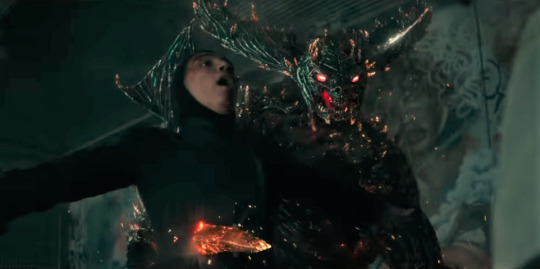
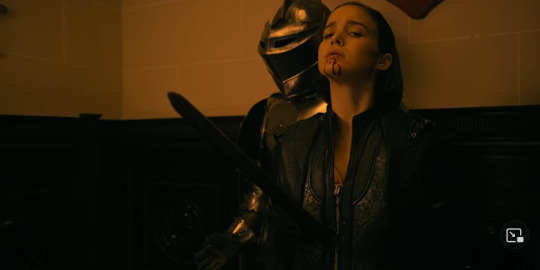
2. Scales, wings, and the Book of Revelation
By the time season 2 rolls around though, Lilith quickly becomes a full-time antagonist, developing scales and leathery wings as she descends further into villainy. At this point, I think the most salient Biblical touchstone for her is the dragon from Revelation 13. Whereas Adriel is the beast, Lilith is his dragon. Given the physical traits she develops, I think this reference was fairly obvious, and not terribly interesting on its own.
The one wrinkle to this that I will note though, is that I think her role as the dragon was already alluded to in season 1. She is the last person who is not Kristian that Jillian Salvius and Michael Salvius interacts with. I think her brief interaction with Jillian and Michael in episode 9 (before she teleports off to the Vatican) is to establish her as the dragon that stood ready to devour the child of the Woman of the Apocalypse (Rev. 12:4). Here, Jillian is the Woman of the Apocalypse, whose child (Michael) was taken away to God (Reya) upon birth (Rev. 12:1-6). Not sure what the significance (if any) of this is in context of the Warrior Nun narrative, but I thought it was pretty neat.
Anyway, tl;dr, scales + wings = dragon!Lilith.
3. A parallel to the conversion of St. Paul
All right, here's the one that drives be absolutely insane, because buried in the midst of all these obvious, in-your-face dragon references, there is a reference to St. Paul of the Pauline epistles! And i can't, for the life of me, figure out what it means for Lilith.
I first noticed this parallel to St. Paul during the scene in season 2, episode 5 where Adriel burnt Lilith's eyes:

This immediately dredged up from the depths of my memory the following image:
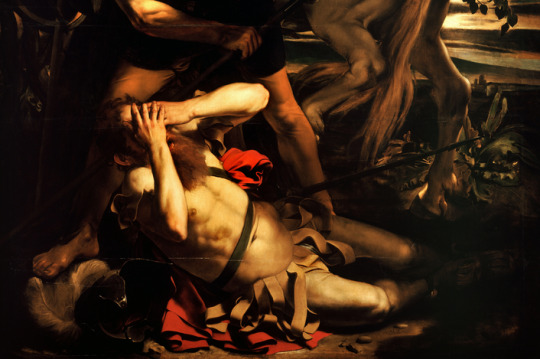
(Source: Wikimedia)
This is the lower half of Caravaggio's The Conversion of Saint Paul. Look at how he is on the ground. Look at the way he is covering his face. Is the show deliberately trying to get us to connect Lilith with St. Paul, or was the framing of LIlith's blinding subconsciously conjured from the brain of someone steeped in Catholic iconography?
In any case, this was the scene that got me thinking about Lilith and our boy Paul. Much like our boy Paul, Lilith was blinded but had her vision restored. Unlike our boy Paul whose restoration of vision was accompanies by scales falling from his eyes (Acts 9:18), Lilith gains some lovely scales under her eyes that totally do not make her look like a raccoon:

In addition, unlike Saint Paul, who simply regains his regular vision, Lilith also gains the ability to see "reality," whatever that means. (To the audience's knowledge, it means she sees wraiths, but I have my suspicions that maybe there's more to it than that.)
The interesting thing to me about this reference to Paul, is that it was so strong, but confined to this one specific episode. Lilith never does anything that calls back to this moment for the rest of the season. Nor do her actions at all jive wit what Paul decided to do with this life after he regains his sight (spread the word of Jesus Christ far and wide), unless we count her feeble attempt at converting Ava to Adriel's side during their episode 7 fight.
So, where does this leave us? Why the random reference to Paul in the middle of the season when we already have the dragon of Revelation pretty much right in our faces? Is this a hint at the next step of her journey? Something clearly changed for Lilith during Ava's final confrontation against Adriel—she goes from actively helping him to becoming a bystander, content to watch him get ripped apart by Tarasks. Not to mention her sudden change of attitude in helping Ava, and telling Beatrice that she hopes that they will be on the same side during the upcoming Holy War. Maybe she's meant to play a Paul-like role if the show had managed to get a third season.
tl;dr: Lilith makes my Bible trivia brain go brrrrrrrr. I need someone more knowledgeable in these things to come tell me how I'm getting this all completely wrong.
#i can't believe i have so many thoughts on a supporting character in this silly show#i can't believe i read the book of revelation for this#i also read all of the epistles in a day (for a separate endeavour)#i know i'm probably overthinking a this and that the doylist explanation is probably something mundane like#“we chucked in whatever christian imagery we thought was cool”#but this does not mean i cannot attempt and fail at using it as an excuse to do a deep dive into christian eschatology#warrior nun#hb has thoughts#hb watches: warrior nun
21 notes
·
View notes
Text
btw on the tangent of end of history ass bullshit I put my finger recently on why adapting Good Omens as a modern-day story bugs me
bc I Have Known. bc I was a comedy-fantasy afficianado in the 90s/early 2000s. that GO is one of many examples of a very specific genre of British comedy-scifi-fantasy popular in the 90s I would term "millennial apocalypse farce".
you know, they're a mix of biblical eschatology, Fortean Times conspiracy theory, cult tropes, and Y2K Rise of the Machines stuff, smashed together into an Adamsian comedy where a group of hapless protagonists bumble around while the world falls apart in comically overblown ways. imo, though a lot of authors bring their own spin to it, they're all heavily stylistically influenced specifically by Dirk Gently, which isn't Millennial Apocalypse Farce but I think did inspire a lot of it. Robert Rankin is on the edge of it, Good Omens is the most lasting example, but I read like 20 of these and most authors only wrote one afaict.
but the thing I was saying the other day is I honestly cannot think of a genre of popular English-language fiction that's more rooted in a specific time and culture. I tried for a while and really couldn't.
It just doesn't translate well away from the turn of the millennium, purely because the millennium was such a fevered touchpoint for Apocalypse Stuff. two things there I think.
Obviously, Y2K looming. Millennium Approaches. The turn of every century has often been accompanied by an uptick in interest in apocalypses and end times, but this was the BIGGIE. It's only happened on this calendar once before. People in the 1900s were talking about how close they were to a new millennium. The approaching millennium dominated the whole 20th century, and especially with how apocalyptic a lot of the 20th century felt in terms of war and technology, apocalyptic fervour really kicked up in the 90s. And there was a smorgasbord of apocalypses to choose from; divine, nuclear, digital, cosmic, alien, all stuff which on the millennial scale had really only just shown up in the last century or so. I was 7 in 2000 so pinch of salt but I remember all of us sort of holding our breath leading up to Jan 1 2000, not just bc of Y2K but bc it felt like something momentous HAD to happen.
The end of history. The cold war had subsided, and so had the economic depression of the 70s and 80s UK. There just was not a Singular Apocalypse hanging over a group of people who'd spent their whole lives in the shadow of a Singular Nuclear Apocalypse. I think stuff really rushed in to fill that gap, and Millennial Apocalypse Farce is a response to that sudden glut of possible apocalypses all clamouring for attention.
I think as well American end-of-days right-wing evangelism was really loud in the 80s-90s and that plays a part, cause the generally lefty and consciously self-effacing British comedy author milieu found that off-putting in a very mockable way
but the point is that glut of apocalypses was a real flash in the pan, the same way the End of History was. it was a like 10-15 year timespan where the world was definitely ending but nobody could say why or how, and it began around the fall of the Berlin Wall and ended on September 11, 2001.
Millennial Apocalypse Farce novels did keep coming out after 2001 but like everything else, the culture has changed really radically, and also, like, we were past the millennium. Those infinite possibilities of apocalypses hadn't paid off. Not saying that the public interest in apocalypse went away - 2012, obviously. The LHC. But the full on fervour for any and all crank apocalypses kind of petered off a bit bc the turn of the millennium was so much a flashpoint for it. and anyway we had really concrete apocalypses again - terrorism, totalitarian governments, plague, and of course the main 21st century apocalypse, Oh Shit We Really Fucked This Climate Change Thing Up.
and I really love the Millennial Apocalypse Farce genre. I really love stumbling on books in that genre. because it's such a time capsule for an incredibly specific period in recent cultural history.
but it does not translate into a 2020s setting. It's so 90s. it's so rooted in a really specific landscape of cultural anxieties and abstractions. it just doesn't make sense to me to translate it to the modern day, it's like setting Angels in America in 2023. it's just the wrong type of apocalypse. apocalypses are culturally generated and they change fast based on how a culture sees itself and the world. you can't pick up a 1990 apocalypse and put it unchanged in 2023, it's Wrong. if you're going to do that you have to be in conversation with it, you can't just update it.
like ok example of thoughtfully recontextualising an anachronistic apocalypse for a modern setting. War of the Worlds 2005. Why is it War of the Worlds? Because it wants to say some things about the relationship between post 9/11 America and colonial England, and how the specific common anxiety of invasion affects them as people in a nation of invaders. Idk if it's a good film cause I didn't like it when I watched it but that was a long time ago. But the intent makes sense.
what does putting a Millennial Apocalypse Farce in the 2020s actually. say? about the commonalities between now and then? I mean. Based on the TV show of Good Omens, to me, not a lot. It's pretty beat for beat in that sense, and we're not really far enough away from 1990 for it to have the obvious impacts that saying "now is very like then" does with, say, War of the Worlds, because the world of HG Wells was distant enough for a 2005 audience to go 'oh, Victorian colonialism, that's Not Like Us.' whereas like. I remember the 90s. It's not recent but it's in continuity with now. saying "then it's like now" is a) kind of Incorrect imo, the cultural anxieties are Very Different, and b) not...striking?
idk like. The genre is dated. The nature of that specific apocalypse idea is incredibly dated. And that's good actually. It's fine for art to be a time capsule of a specific cultural moment and to not make sense divorced from that moment. That's good! That's a good use of art!
22 notes
·
View notes
Text
If you ask people on here about some Salafist Jihadi suicide bombing they will very accurately discuss the geopolitical context of colonialism and the petro-kleptocracies Western powers ally with in the Middle East to get our oil fix. They may mention how Salafism has been promoted at some times by western powers as a counter to communism. If they are really up on their game they will dissect jihadi-salafi ideology as a modern political movement with a clearly modern, political lineage. What they won't do is say some stupid shit about how Muslims blow them selves up to get with 70 virgins in paradise, because that is stupid, and reductionist, and isn't an explanation that actually explains the world and the way it works. In short, people will, correctly, look at religious fundamentalism and place it in it's proper historical and political context without making broad essentialist claims about how modern people's behavior can be trave to some timeless theological essence of a religion. This is a good, skeptical, rigorous approach.
But when asked about why say, evangelical Christians support Israel's occupation of the West Bank, people become credulous and will absolutely believe that details of Evangelical eschatology explain the political behavior of 30% of the American public. And that's just...well like I said, it is credulous. And reductionist, and it isn't the way the world works, and it doesn't actually explain the world or human behavior. Because American Evangelical fundie assholes are as much creatures of politics as Wahabbi fundie assholes.
Let's take support for Israel. This is something where leaders of the Evangelical movement like Jerry Falwell very deliberately tried to influence their congregants to a certain perspective. And I would submit that this was because of politics - because evangelical leaders saw Israel as an ally against communism, and then, in the 90s, as an ally against Islam in the creepy existential struggle the global right was and is trying to make the defining conflict of our times. The weird shit about Zionism being necessary for the rapture is, in this explanation, a post hoc justification for their political position, a way of finding a supposed Biblical basis for what they want to believe anyway.
And I think this is how these assholes mostly work. Christian Nationalism is not a purely theocratic movement trying to institute Biblical Law, but also quasi fascist nationalist movement that sees their vision of America as divinely ordained. In many cases, their theology flows from their politics, not the other way around. It is a way of sanctifying conservative politics and calling them God's Will.
Basically, their view is that the power structures of American Society - Racial Hierarchy, patriarchal families, capitalism - are sacred, and they build their theology around that. This is the way it was in the 19th century where groups like the Southern Baptists were founded by slaveholders to create a Christianity that would defend and uphold slavery against alternative theological interpretations that said 'maybe owning people is wrong'.
Thus the best way to understand them is not through the post hoc theology and details of scriptural interpretation but through looking at what power structures that theology sanctifies and defends. This explains their actual behavior - why they embraced Divorcee Ronald Reagan and his astrology loving wife over pillar of the church and possible living saint Jimmy Carter, why they supported Donald Trump over a literal Sunday School Teacher, why they give away AR-15s in Church. It explains why they will ally with literal Atheist activist James Lindsay against people in their own churches who are attempting to achieve racial reconciliation or at least acknowledge the extent to which their religious tradition was founded by slaveholders. It also explains why they are never going to drop out of society and live like monks, because the banal comfort and perceived safety of American suburbia is sacred to them. Theirs is a small, weak and false god, thankfully.
8 notes
·
View notes